试卷简介
试卷预览
Passage1
Much of the fiction written by American women in the twenty-first century can be termed"popular,"owing to its sustained engagement with an expansive but clearly defined readership. Since the 1990s, popular women's fiction has been dominated by "chick lit,"a term that has come to signify a particular brand of commercial fiction. In her article "Who's Laughing Now? A Short History of Chick Lit and the Perversion of a Genre,"novelist Cris Mazza credits herself with inventing the taxonomy in her capacity as co-editor of an anthology of new women's writing. The stories in Chick Lit sought "not to embrace an old silly or coquettish image of women but to take responsibility for our part in the damaging,lingering stereotype." Mazza coined the term hoping that critics would recognize its "ironic intention"; as she observes, the ironic inflection of the term evaporated with the inception of the "second incarnation”of Chick Lit. It is this second incarnation that became publishing phenomenon in the 1990s and continues to thrive in the twenty-first century.
Arguably, toneis the defining characteristic of the genre. The signature tone
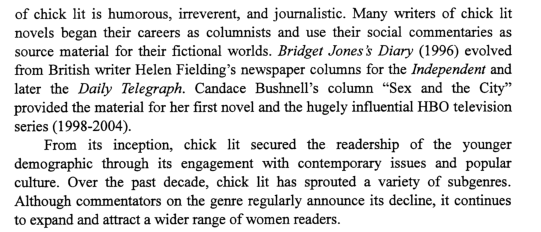
A.a publisher
B.a critic
C.a novelist
D.a creditor
A.negative
B.neutral
C.complimentary
D.pleasant
A.objective
B.amusing
C.influential
D.rhythmic
A.commentators
B.newspaper columnists
C.journalists
D.younger readers
A.modern literary criticism
B.recent commercial activities
C.current publishing phenomenon
D.women's life in contemporary society
Passage2
I saw Jane last night for the first time in years. She was miserable. She had bleached her hair, trying to hide its true color, just as her rough appearance hid her deep unhappiness. She needed to talk, so we went for a walk. While I thought about my future, the college applications that had recently arrived, she thought about her past, the home she had recently left. Then she spoke. She told me about her love-and I saw dependent relationship with a dominating man. She told me about the drugs-and I saw that they were her escape. She told me about her goals-andI saw unrealistic material dreams. She told me she needed a friend-and I saw hope, because at least I could give her that.
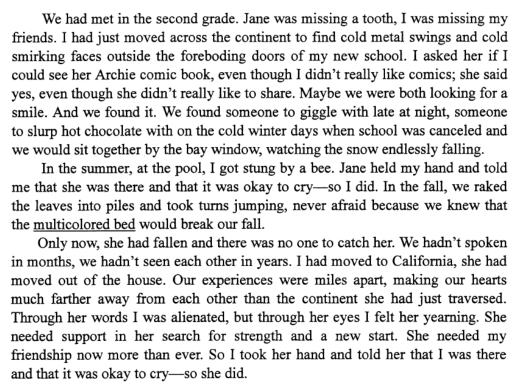
A.drugs
B.loneliness
C.her marriage
D.her financial situation
A.the book was interesting
B.the school offered few such books
C.Jane highly recommended this book
D.the author intended to make friends with Jane
A.the pile of leaves
B.the colored cushion
C.the flower-bed outside
D.the grassland in the fall
A.faded
B.ended
C.maintained
D.strengthened
A.Friendship Withers
B.Friendship Cures
C.Friendship Bygone
D.Friendship Overwhelmed
Passage3
Questions 11 to 15 are based on thefollowing passage.
Facebook, the Web's most popular social networking site, has been caught in a content-rights battle after revealing that it was granting itself permanent rights to users'photos,wall posts and other information even after a user closed an account.Under fire from tens of thousands of users Facebook posted a brief message on users' homepages that said it was returning to its previous"Terms of Use"policy.
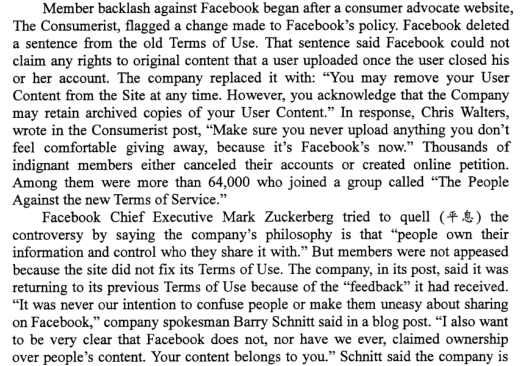
is in the process of rewording its Terms of Use in "simple language that defines Facebook's rights much more specifically."
A.essentially identical to the old
B.comparatively more user-friendly
C.actually for trial implementation only
D.less reasonable in handling content rights
A.establish an organization to protect users'benefits
B.launch an online petition against Facebook's old policy
C.call users'attention to the risks of Facebook's policy change
D.warn Facebook of the security problems caused by such change
A.content uploaded will be saved in archives for the site's use
B.content will have to be examined by the site for users'benefit
C.users should submit copies to the site when uploading content
D.users must agree to transfer the ownership of the content to Facebook
A.delete a sentence in its new Terms of Use
B.issue a statement to defend its position
C.make modifications in its philosophy
D.resume the old terms of user rights
A.Facebook's inappropriate use of language
B.Facebook's' deliberate invasion of users'privacy'
C.Facebook's change of policy on online file storage
D.Facebook's reluctance to compensate users for their losses
Passage4
Questions 16 to 20 are based on thefollowing passage.
Eugenics(优生学) could be found everywhere in the U.S. in the1920s.It influenced American politics, social sciences and medicine. It shaped public policy,aesthetic theory and literature and affected popular culture. Eugenic thinking was so popular in the modern era that it attained the status of common sense.From the beginning of eugenics in the late-nineteenth-century England to its peak in the U.S. during the postwar years of the late 1910s and 1920s, few challenged the notion that modern nations especially those troubled by immigration, must improve their population in order to remain competitive in the modern world.
Scholars have recently begun to acknowledge the profound influence of eugenic thought on modern white American and British writers, yet it remains
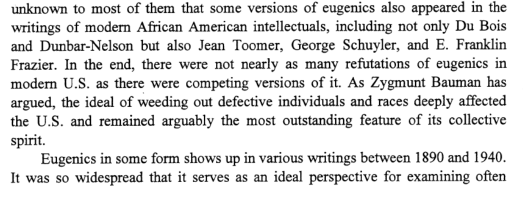
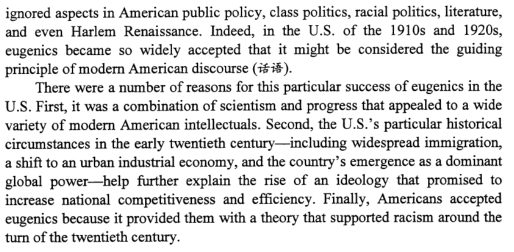
A.the eugenic theory was dangerous and should be rejected
B.eugenics would make the U.S. a more competitive nation
C.immigrants would greatly improve the American population
D.immigrants would make the U.S. more powerful in the world
A.White American writers didn't support eugenics
B.Black American intellectuals mistrusted eugenics
C.Eugenics influenced both white and black Americans
D.Many people refuted eugenics in the U.S. in the 1920s
A.scientific research
B.individual health
C.collective responsibility
D.improving their population
A.between 1890 and 1910
B.in the 1910s and 1920s
C.between 1920 and 1940
D.in the late 19th century
A.politics
B.economy
C.education
D.immigration
Passage5
Charles Darwin was born on February 12, 1809, at Shrewsbury, England, the second son of Dr.Robert Darwin, an eminently successful physician. From his earliest youth,Darwin was passionate lover of the outdoors. As he himself said, "I was born a naturalist."Every aspect of nature intrigued him. He loved to collect to fish and hunt, and to read nature books School, consisting largely of the study of the classics, bored him intolerably. Before he turned seventeen years old, his father sent him to the University of Edinburgh to study medicine. But medicine terrified Charles, and he continued to devote much ofhis time to the study of nature. When it became clear that he did not want to become a physician, his father sent him early in 1828 to Cambridge to study theology. This seemed a reasonable choice, since virtually all the naturalistsin England at that time were ministers, as were the professors at Cambridge who taught botany and geology. Darwin's letters and biographical notes show that at Cambridge he devoted more time to collecting beetles, discussing botany and geology with his professors, and hunting and riding with similarly inclined friends than to his studies. Yet he did well in his examinations, and when he took his B.A. in 1831 he stood tenth on the list of non honors students. More importantly, when Darwin had completed his Cambridge years he was anaccomplished young naturalist.
Immediately upon finishing his studies, Darwin received an invitation to join The Beagle as naturalist and companion of Captain Robert FitzRoy, who had been commissioned to survey the coasts of Patagonia, Tierra del Fuego, Chile, and Peru to provideinformation for making better charts. The voyage was to be completed within two or three years but actually lasted five. The Beagle left Plymouth on December27, 1831, when Darwin was twenty-two years old, and returned to England on October 2, 1836. Darwin used these five years to their fullest extent. In his Journal of Researches, he tells about all the places he visited-volcanic and coral islands, tropical forests in Brazil, the vast pampas of Patagonia, a crossing of the Andes from Chile to Tucuman in Argentina, and much, much more. Every day brought unforgettable new experiences, a valuable background for his life's work.He collected specimens from widely different groups of organisms, he dugout important fossils in Patagonia, he devoted much of his time to geology, but most of all he observed aspects of nature and asked himself many questions asto the how and why of natural processes. He asked "why" questions not only about geological features and animal life, but also about political and social situations.And it was his ability to ask profound questions and his perseverance in trying to answer them that would eventually make Darwin a great scientist.
A.medicine
B.physics
C.nature
D.theology
A.he was one of the top students
B.he did fairly well at Cambridge
C.professors failed to notice his talents
D.theology appealed to him very much
A.coasts
B.plants
C.animals
D.peoples
A.FitzRoy's biography
B.Darwin's travelogue
C.Darwin's letters
D.FitzRoy's diaries
A.love of nature
B.family background
C.critical thinking skills
D.biological achievements

 最新推荐
最新推荐
 相关试卷
相关试卷

 原创试题专区
原创试题专区 开通学校服务
开通学校服务






